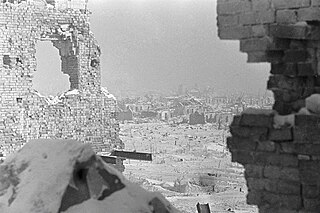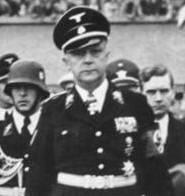
The Nuremberg trials were held by the Allies against representatives of the defeated Nazi Germany, for plotting and carrying out invasions of other countries, and other crimes, in World War II.

Alfred Josef Ferdinand Jodl was a German Generaloberst who served as the chief of the Operations Staff of the Oberkommando der Wehrmacht – the German Armed Forces High Command – throughout World War II.

Wilhelm Bodewin Johann Gustav Keitel was a German field marshal and war criminal who held office as chief of the Oberkommando der Wehrmacht (OKW), the high command of Nazi Germany's Armed Forces, during the Second World War. In that capacity, Keitel signed a number of criminal orders and directives that led to numerous war crimes.

Nacht und Nebel, meaning Night and Fog, was a directive issued by Adolf Hitler on 7 December 1941 targeting political activists and resistance "helpers" in the territories occupied by Nazi Germany during World War II, who were to be imprisoned, murdered, or made to disappear, while the family and the population remained uncertain as to the fate or whereabouts of the alleged offender against the Nazi occupation power. Victims who disappeared in these clandestine actions were never heard from again.
The Nuremberg principles are a set of guidelines for determining what constitutes a war crime. The document was created by the International Law Commission of the United Nations to codify the legal principles underlying the Nuremberg Trials of Nazi party members following World War II.

Konstantin Hermann Karl Freiherr von Neurath was a German diplomat and Nazi war criminal who served as Foreign Minister of Germany between 1932 and 1938.

Events from the year 1942 in Canada.

Events from the year 1943 in Canada.
The Obersalzberg Speech is a speech given by Adolf Hitler to Wehrmacht commanders at his Obersalzberg home on 22 August 1939, a week before the German invasion of Poland. The speech details, in particular, the pending German invasion of Poland and a planned extermination of Poles. It shows Hitler's intention to carry out this genocide in a planned manner.

Events from the year 1946 in Canada.
A war of aggression, sometimes also war of conquest, is a military conflict waged without the justification of self-defense, usually for territorial gain and subjugation.

The Hitler cabinet was the government of Nazi Germany between 30 January 1933 and 30 April 1945 upon the appointment of Adolf Hitler as Chancellor of the German Reich by president Paul von Hindenburg. It was originally contrived by the national conservative politician Franz von Papen, who reserved the office of the Vice-Chancellor for himself. Originally, Hitler's first cabinet was called the Reich Cabinet of National Salvation, which was a coalition of the Nazi Party (NSDAP) and the national conservative German National People's Party (DNVP).

German-occupied Poland during World War II consisted of two major parts with different types of administration.
Walter Paul Emil Schreiber was a medical officer with the German Army in World War I and a brigadier-general (Generalarzt) of the Wehrmacht Medical Service during World War II. He would later serve as a key witness against Hermann Göring during the Nuremberg Trials.

A crime of aggression or crime against peace is the planning, initiation, or execution of a large-scale and serious act of aggression using state military force. The definition and scope of the crime is controversial. The Rome Statute contains an exhaustive list of acts of aggression that can give rise to individual criminal responsibility, which include invasion, military occupation, annexation by the use of force, bombardment, and military blockade of ports. Aggression is generally a leadership crime that can only be committed by those with the power to shape a state's policy of aggression, rather than those who carry it out.
Otto Heinrich Kranzbühler was a German naval judge who represented defendant Grand Admiral Karl Dönitz before the International Military Tribunal at the Nuremberg Trials.

During World War II, Nazi Germany engaged in a policy of deliberate maltreatment of Soviet prisoners of war (POWs), in contrast to their general treatment of British and American POWs. This policy, which amounted to deliberately starving and working to death Soviet POWs, the bulk of whom were Slavs, was grounded in Nazi racial theory, which depicted Slavs as sub-humans (Untermenschen). The policy resulted in some 3.3 to 3.5 million deaths.

Friedrich Karl Freiherr von Eberstein was a member of the German nobility, early member of the Nazi Party, the SA, and the SS. He was elected to the Reichstag and held the position of the chief of the Munich Police during the Nazi era. Eberstein was a witness at the Nuremberg Trials.
The Council of Ministers for the Defense of the Reich was a six-member ministerial council created in Nazi Germany by Adolf Hitler on 30 August 1939, in anticipation of the invasion of Poland – which provoked the beginning of World War II – with the purpose of allowing the continuation of the Nazi government, especially in relation to the war effort, while Hitler concentrated on prosecuting the war. The council has been described as functioning as a "war cabinet," although this assessment is disputed.
The Secret Cabinet Council in Nazi Germany, also sometimes referred to as the Privy Cabinet Council, was a nine-member governmental body created on 4 February 1938. The Council was established by decree of Adolf Hitler with the purpose of advising him in the conduct of foreign policy. It was established ostensibly to be a sort of “super cabinet” of close foreign policy advisors. In reality, the Council was a paper organization without any real power and never actually met.











